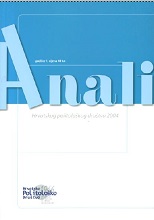Dinamika europske integracije danas
Dynamics of European Integration Today
Author(s): Luka BrkićSubject(s): Politics / Political Sciences
Published by: Hrvatsko politološko društvo
Summary/Abstract: Since signing of the Maastricht Contract until the European Union Summit in Belgian Laeken and Convention about the Future of Europe from October 2001 there are debates about the relation between integration and sovereignty of the European Union member states. In political choice of the arrangement of the free trade, we analyze social integration as a mechanism of reduction of comparative advantages of countries excepted from the integration. Debate about the development of multilateral institutions and political consequences of their expansion we contextualize within the classical cooperative theory of play. First we analyze the approach of inclusive formation as a simple process in which all potential members of multilateral institution are called and when there are no changes of preferences. On the other hand, sequential construction is characterized by the process consisting of several phases in which multilateral institution only gradually grows up, and decisions abut acceptance depend on whether acceptance of new members will lead to instant benefits, and not on expectations of future benefits. In the context of controversies about whether integrations propel supra-national or international factors, we analyze the development of the EU in direction of horizontal relation between market and a state, and vertical relation between the Union and member states. These both perspectives agree that the core of Roman Contracts consists of common market, four freedoms, and right to competition and that the Union is established for the purpose of creation of common market, and in realization of these tasks it uses limited authorities. Differences are, however, in that the first position considers that through new politics of the Union foundations of the subsequent discretionary penetration into the market are established, while for the other creation of common market represents only one step which leads to European social state for the purpose of institutional balancing of the European construction. The idea of European Constitution is understood as one more effort in preparation of institutions and legal guaranties which are to facilitate creation of unity. We analyze the proceedings of decision-making and relations of strengths. The article ends with one more attempt of therapeutic reformulation of the existent relation between Croatia and European integrations, in which it is emphasized that integration is not a formula for solving all our problems and cannot be a substitute for successful politics of development.
Journal: Anali hrvatskog politološkog društva
- Issue Year: 2004
- Issue No: 01
- Page Range: 79-98
- Page Count: 20
- Language: Croatian

